'We are the people that we serve': How an ex-abortion clinic became a lifeline for Black moms
AUSTIN, Texas – It’s been months since Nakeenya Wilson signed the lease, but several times a week people still show up at her door confused.
The building Wilson rents previously housed one of the largest abortion providers in Texas. Two years after the Supreme Court eliminated the longstanding constitutional right to abortion, she still has to explain the clinic is gone and abortion care is no longer offered at the building tucked away, off a busy highway that runs through the state Capitol.
She recently had that difficult conversation with a mother and daughter.
“They were looking for Whole Women’s Health and her mom just kept saying in Spanish, ‘No, but like, where are they?’” Wilson said. “And with my limited Spanish-speaking skills, I was trying to communicate to her, ‘No, it doesn't exist anymore. It didn't just move. You cannot access these services in Texas.'”
On another day, Wilson said a Black woman who had just found out she was pregnant showed up looking for The Source, a crisis pregnancy center that took over the building in 2019. Wilson explained they’re gone, too.
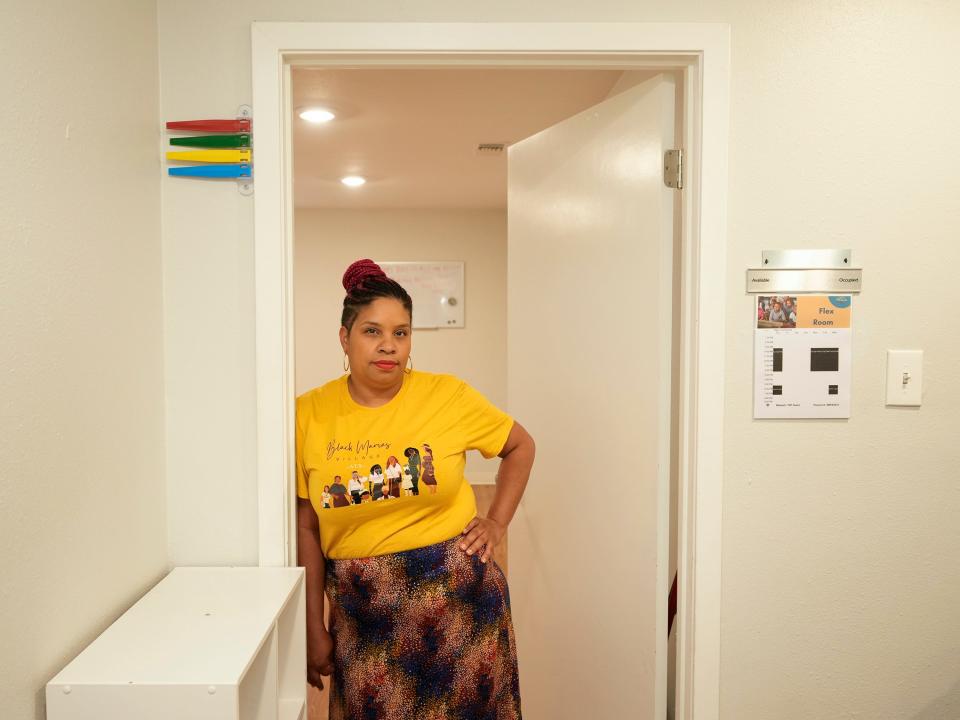
Wilson cannot provide what these stray patients are seeking, but she has carved out a place to assist Black moms in the space that remains since the Dobbs v. Jackson Women's Health Organization ruling in 2022 paved the way for 14 states to enact near-total abortion bans. She is part of a group of advocates and health care providers hoping to fill the vacuum left by the former clinic in a meaningful way.
Wilson is the founder of Black Mamas Village, a nonprofit dedicated to supporting Black women and their families through “increasing connection and belonging, health and wellness, and economic empowerment.” And she shares the space that was formerly used by the clinic, now known as The Village Place, with several other nonprofit organizations and local business owners that align with that mission, including midwives, doulas and a perinatal mental health nurse practitioner.
She's among many advocates across the country working to mitigate racial disparities in health care for people carrying babies to term. Black women are nearly three times as likely to die during or after giving birth, according to the CDC, and in states with abortion bans, women are up to three times more likely to die during pregnancy, childbirth or soon after giving birth, according to a 2023 report from the Gender Equity Policy Institute.
"There are a set of corrective measures that are really about tackling systemic biases throughout the healthcare system... It's hard work, but it's also essential if you really try to build something that's workable for the future that is better than what we had before that's really responsive to the needs of all patients, particularly those who are most vulnerable who have the least economic capacity and have access to health care," said Jocelyn Frye, president of the National Partnership for Women and Families.
How a former abortion clinic became a hub for Black moms
The first time Wilson entered the former clinic in north Austin was in 2007.
She was unmarried, pursuing a master’s degree in social work and struggling to make ends meet, with a daughter in prekindergarten, when she found out she was pregnant again. She said she went to Whole Woman’s Health and had an abortion in a room that’s now used by a homeschool pod, where 11 students, including Wilson’s youngest daughter, attend school.
“I don't remember much more,” she said, sitting in the building’s colorful kitchen in late May. “It's one of those experiences that really does feel a bit out-of-body,” she said.
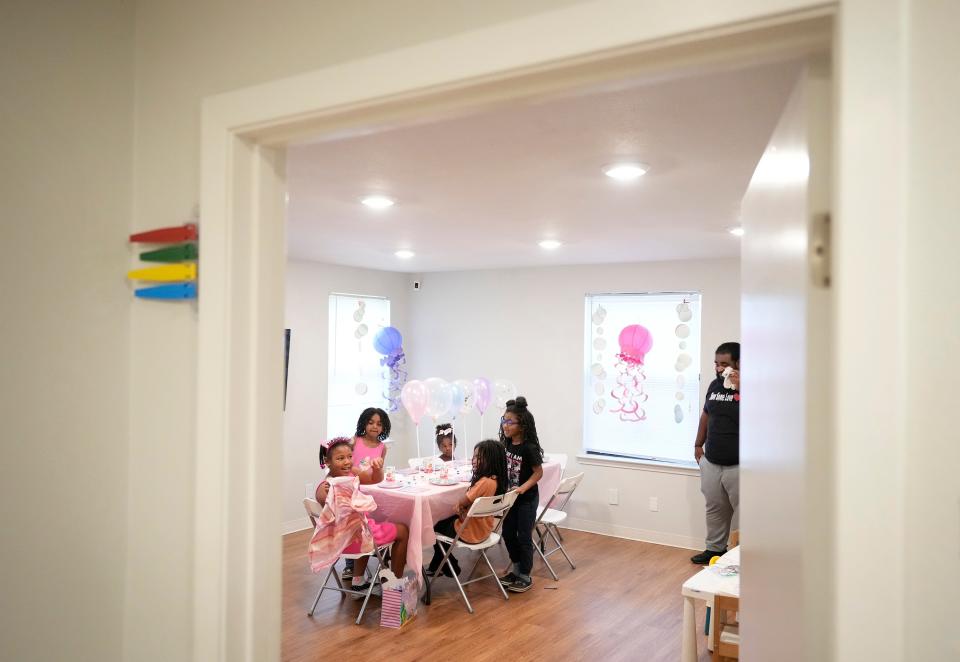
During the following years, Wilson often looked over at the clinic’s sign as she drove by it on the highway. One day, she noticed it had disappeared and been replaced by a sign for The Source.
In 2016, Wilson had her second child. She developed preeclampsia, a serious form of high blood pressure, and the delivery was difficult for both her and her son. His shoulders became stuck in the birth canal during delivery, a condition known as shoulder dystocia, and she began to hemorrhage. The medication she was given to treat the bleeding exacerbated her high blood pressure, she said.
Wilson knows it’s common to hear similar stories from other Black women, including celebrities like Serena Williams. In 2022, the maternal mortality rate for Black women was 49.5 deaths per 100,000 births compared with 19 deaths per 100,000 for white women, 16.9 for Hispanic women and 13.2 for Asian women, according to the most recent data from the Centers for Disease Control and Prevention.
The United States has some of the worst rates of maternal mortality among high-income countries, particularly for Black women and women in states where abortion is banned or restricted. Strict abortion bans have also prompted health care providers to leave and clinics to close, worsening access to care.
In Texas, the problem of maternal mortality is particularly acute: Though fewer than 1 in 10 people live in the state, 1 in 7 of all maternal deaths took place in the state, which has among the most limited abortion access in the country. More than 80% of pregnancy-related deaths are preventable, according to the CDC.
Still, Wilson’s experience shocked her. When she gave birth in 2016, she felt she had all the advantages needed to do so safely.
“I had a master's degree, was solidly middle class, married, private insurance, fetal medicine specialists, I had the same doctor for the first one as the second one,” she said.
After her traumatic birth experience, Wilson got involved in a number of community organizations focused on improving maternal health outcomes for Black women, including the state’s Maternal Mortality and Morbidity Review Committee.
Then, in the middle of her term, she had to reapply for her position as a community advocate. Late last month, she found out her application was rejected and the community advocate positions would be filled two doctors, including an outspoken anti-abortion OB-GYN. Wilson said that news is "still stinging."
"Essentially now there's nobody with lived experience and nobody that represents those most impacted at the table, coming up with solutions," she said. "That is not a best practice, and I think it is not respectful to families and Texans and the losses that we experience and the disparities that we experience."
Dr. Ingrid Skop, who now holds the rural community member position, the slot that Wilson hoped to fill, said in a statement to USA TODAY she has long cared for women traveling long distances from rural Texas maternity deserts.
"For over 30 years, I have advocated for both of my patients, a pregnant woman and her unborn child, and excellent medicine shouldn’t require I pit one against the other," Skop said. "Any attempt to discredit me because I stand by my Hippocratic Oath to do no harm to any of my patients is rooted in pro-abortion ideology and bias."
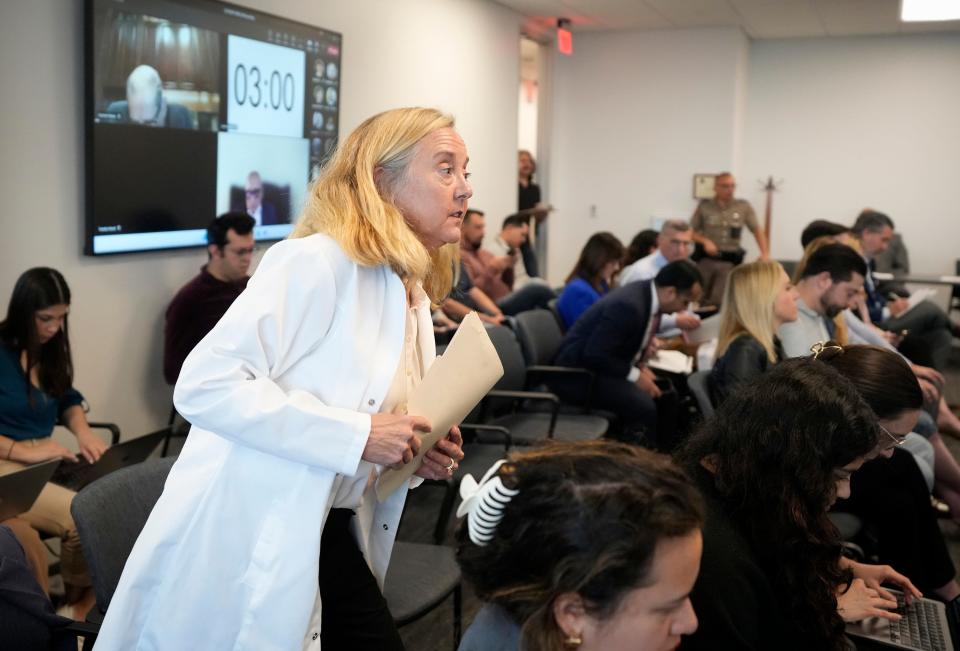
Meanwhile, Wilson was feeling isolated in the outskirts of Austin, a predominantly white city, so she started a Facebook group for Black moms to swap stories and schedule playdates. As the group grew and pandemic-related restrictions eased, Wilson decided they needed a physical space to meet in.
Wilson said the day she came to sign the lease for the building Black Mamas Village now occupies, a woman from The Source arrived to pick up baby mattresses. It took a moment, but Wilson realized they’d met before. The woman had taught the childbirth education classes Wilson attended during her first pregnancy at another location owned by The Source, previously known as Austin LifeCare.
“Both of the organizations who provided services in this space helped me in different seasons of my life… And we are in a way, a third generation of organization that supports families in this particular location,” she said.
Filling the 'huge need' for resources and community
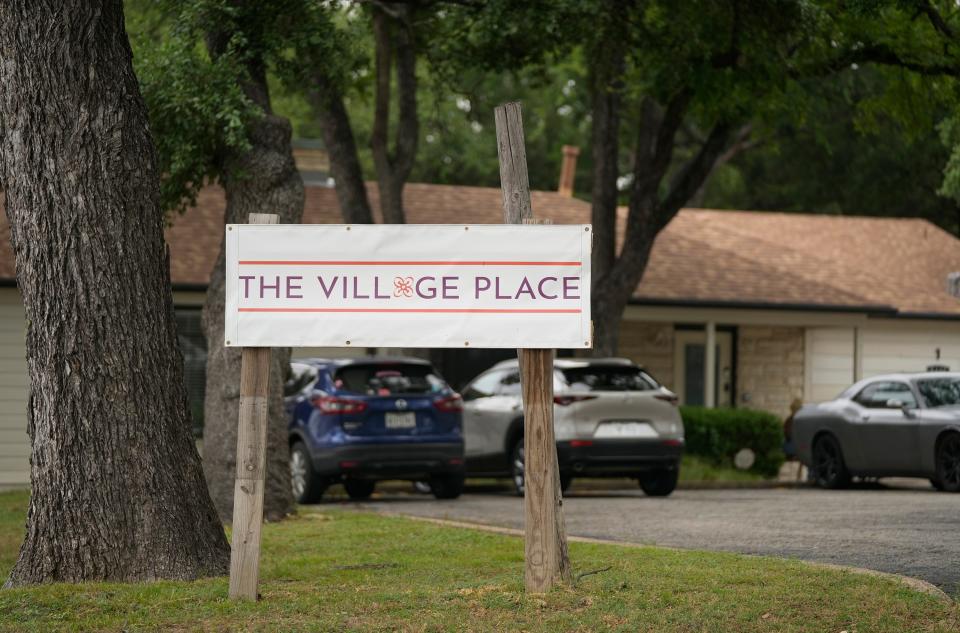
Wilson estimated she put $20,000 of her personal funds into developing and renovating the space. There are still visual reminders of what the place once was - exam room flags by the doors, pass-through boxes to collect urine samples in the bathroom - but there is also a colorful library stocked with brand new books and a cozy nap room for moms who need a break.
Wilson began recruiting other like-minded women to work in the building alongside her. She said the rent is over $11,000 each month, but she subsidizes the cost with a $50,000 grant from the St. David's Foundation and rents the space for meetings and parties. Her 12 tenants often barter or exchange services for a reduced rate.
“It really is like collective solidarity economics,” Wilson said.
Her neighbors in the 'collective' include a massage therapist and another Black maternal healthcare nonprofit called Mama Sana Vibrant Woman. Mama Sana holds weekly prenatal and postpartum support groups and offers individualized doula services, midwifery and lactation consultations, serving more than 200 people, according to Tiek Johnson, the organization’s co-executive director.
This is another avenue advocates in Texas and elsewhere that could improve pregnancy outcomes among women of color.
Midwifery care improved multiple birth outcomes, including lowering morbidity and mortality among mothers and newborns, according to a 2023 literature review published in the American Journal of Obstetrics & Gynecology. However, just 8% of certified nurse-midwives and certified midwives identified as Black or African American, the American Midwifery Certification Board found.
Once a quarter, the midwives of Mama Sana also hold free childbirth education classes, sessions which Johnson said would typically cost hundreds of dollars.
“We try to also bring access to things that are usually inaccessible,” Johnson said.
Later, Wilson brought in a dance instructor and the homeschool teacher. Recently, she said she's received funding to hire about a dozen people for a year-long, drop-in childcare program. While not obviously connected to maternal health, Wilson said these offerings are essential to their core mission.
"When we talk about birth justice and reproductive justice, we're talking about everything it takes for a birthing person and their family to thrive and to have autonomy and to have humanity and quality of life that is equal to anyone else," she said. "And so education and childcare, these things are a part of the full picture."
The Village Place is also home to nonprofits dedicated to HIV awareness and sexual health and "resource navigation." Nyeka Arnold, executive director of The Healing Project, said this involves guiding families through the often complex process of acquiring public aid, like rental assistance.
“I was born and raised in a marginalized community, so the resources that I use, I know of them because I use them. And so I just try to tell everybody about the resources, the way it works, the system, the steps,” she said before ducking out to unload a delivery of mushrooms for their weekly food pantry.
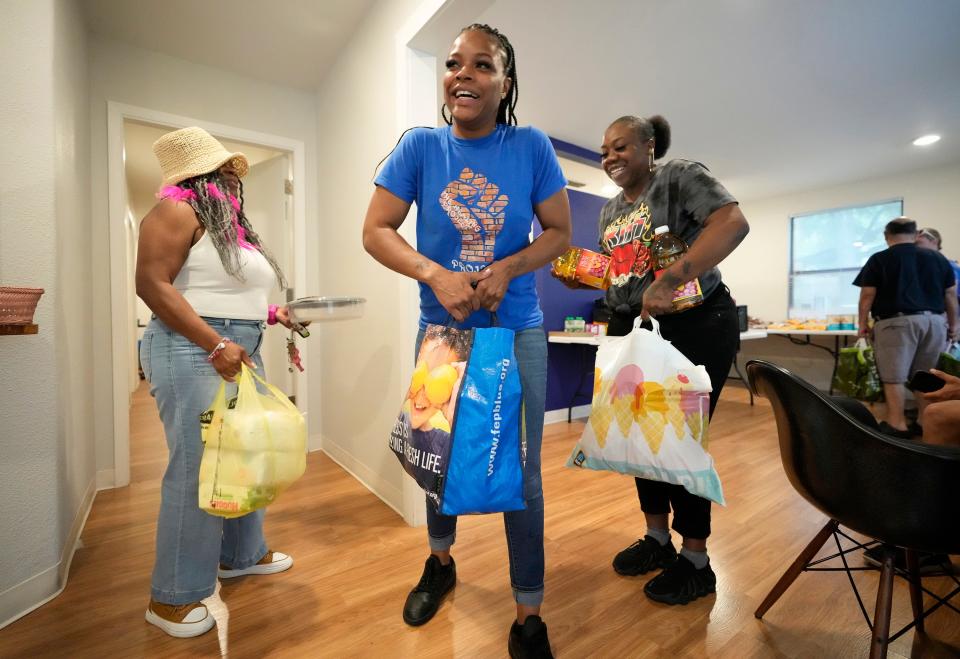
Jennifer Lynn Dungey, a co-owner of The Village Place and board president of Black Mamas Village, knows how exhausting it can be to navigate these systems. Nearly 15 years ago, Dungey moved to Austin for work and lost that job just a few months later. She was seven months pregnant, she said, and couldn’t find a new job. She soon became homeless.
“It was a very humbling experience to go from making $70,000 a year to being broke and applying for a shelter,” she said.
Dungey is now a social worker overseeing a program that works with African American first-time moms in Travis County, Texas, in addition to managing the building and culture of Black Mamas Village. She said what sets the nonprofit apart is that the people who run it have an intimate knowledge of what resources are out there because, as she put it, "we are the people that we serve."
“There’s a huge need for community, huge need for resources and accessible resources without all the demands that are required by different agencies,” she said. “That’s the beauty of what we do.”
Dungey dreams of expanding. It’s been less than a year, but she said it feels like the collective has outgrown the building already.
Though the organizations are able to offer a small stipend to two staff members including Arnold, who helps manage the building, Dungey hopes to be able to hire a full-time staff, further expand the childcare program, and maybe even purchase a nearby hotel so the collective can offer housing.
“This is really just the beginning,” she said.
Contributing: Ken Alltucker and Christine Fernando, USA TODAY; Nancy Flores, Austin American-Statesman
This article originally appeared on USA TODAY: Black maternal mortality is high. Meet the Texas moms trying to help

